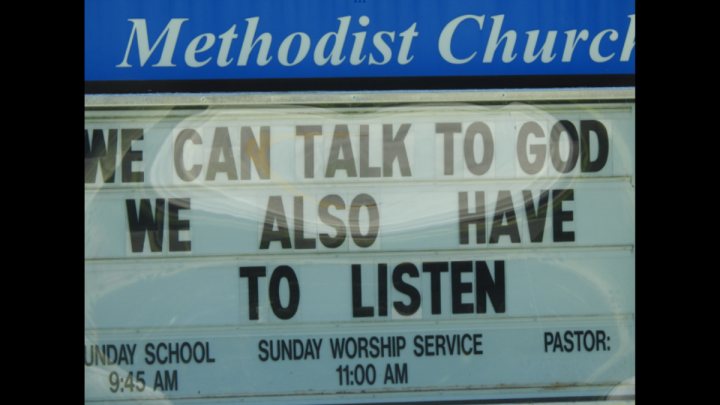I started singing in the church choir at around age five. At that age, my voice was pitched a bit higher than many of the female voices in the choir. On most Sundays, my mother was on the piano bench, and as our worship began, she would play a chorus, which we would all sing. Its words were taken straight out of the writing of Habakkuk: The rhythm was measured and moved at a deliberate pace. “The Lord is in His Holy Temple. Let all the earth keep silence… before Him.” [Habakkuk 2:20] I remember feeling a sense of awe and wonder that right there, on the corner of Bragg and Maple streets, God would show up – without fail – every week. It made me want to sing, but it also gave me reason to still myself in the presence of The Creator.
Someone has well-noted that truth be known – God is every bit as much God in the silence as in the speaking. “Let all the earth keep silence before Him,” Habakkuk declares. Silence is how God enters into this world. Phillips Brooks’ hymn names it: “How silently, how silently, the wondrous gift is given.” Another hymn (UMH 626) speaks of the mystery of God coming among us – and the silent worship offered by those who stand in awe as we contemplate, “The Word became flesh and dwelt among us.” (John 1)
Let all mortal flesh keep silent,
And with fear and trembling stand;
Ponder nothing earthly-minded,
For with blessing in His hand,
Christ our God to earth descendeth,
Our full homage to demand.
Let All Mortal Flesh Keep Silence is a hymn that was originally used to prepare members of the church for the practice of communion. It’s also a reminder to us that the beginning of the new Christian year, in Advent, is as much about silence as it is about prophets declaring: “Prepare ye the way of the Lord!” Our new Christian year doesn’t begin with throngs of reveling people amassed in city squares, with horns and music blaring… but in silence.
Into the silence Barbara Brown Taylor offers us words of wisdom this Advent… words that remind us just how limited our words actually are.
“The central Jewish declaration of faith is not “I believe,” but “Hear, 0 Israel.” The focus is on the ears, not the lips – on listening, not speaking. For the biblical Jew, God’s name was unsayable. The only human being allowed to say it was the high priest in the temple in Jerusalem. Once a year, on Yom Kippur, he dared to utter God’s name out loud as he pleaded for the life of the people. He knew that he risked his own life to do so, and it would never have occurred to him to compose a short, concise description of the G-D he encountered in the holy of holies.
Even now, some Christians have trouble listening to God. Many of us prefer to speak. Our corporate prayers are punctuated with phrases such as “Hear us, Lord” or “Lord, hear our prayer,” as if the burden to listen were on God and not us. We name our concerns, giving God suggestions on what to do about them. What reversal of power might occur if we turned the process around, naming our concerns and asking God to tell us what to do about them?
“Speak, Lord, for your servants are listening…”
Barbara Brown Taylor, “When God Is Silent”
This time of year we will hear a clarion call from time to time to: “Keep Christmas.” The words of an ancient prophet remind us to also “keep silence…
Still in One Peace, Jon (the Methodist)
Jon (the Methodist)
photo credit: Jon Strother

